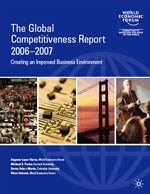Many industrialized countries have in the past 5 years introduced laws that attract highly skilled foreigners to immigrate to their countries while the U.S. is still squeaking by with decades old laws with quotas that were set in an economy that was very different from what we have today. Among the countries that have much favorable immigration policies for the highly skilled over the U.S. are Australia, Canada, United Kingdom, Ireland, Netherlands, Germany, France, Spain, New Zealand.
Many of these countries didn't have any immigration policies for the high skilled until recently and have woken up to the global high skill shortage. They have worked with their educational institutions, industries and come up with immigration policies that will give them the technical leadership that all nations strive to achieve. Many with much lower population than the U.S. have no numerical limits on immigration and attract the high skilled with incentives such as the ability for spouses to take up employment.
Even countries that traditionally were emigrant countries have started policies to stop the bleeding of talent. China offers incentives for its nationals settled abroad to return back. India's economic boom of the last few years has brought many of its nationals working abroad back. Historically, Ireland has been a country of emigration. However, during its economic boom of the mid-1990’s, known as the “Celtic Tiger,” Ireland began to experience a shortage of skilled workers that was felt by many other industrialized countries. From 1999 to 2003, the number of work visas issued rose from 6,250 to 47,000.
While many of these countries traditionally looked up to the U.S. to emulate its immigration policies, they have now learnt enough and have taken the lead with much better policies to attract the global talent while the U.S. is taking a reactionary approach for short term goals and clubbing high skilled immigration in the same bill that deals with illegal immigration. Talk about being clueless!
 A few weeks ago I posted this on how the U.S. is falling back in attracting and retaining foreign talent. The World Economic Forum has now come up with a report on global competitiveness of the worlds greatest economies. The U.S. which used to be number one for a long time? is now toppled to sixth place. Switzerland is at the top most spot. Boston Globe reports some of the reasons for the U.S. performance:
A few weeks ago I posted this on how the U.S. is falling back in attracting and retaining foreign talent. The World Economic Forum has now come up with a report on global competitiveness of the worlds greatest economies. The U.S. which used to be number one for a long time? is now toppled to sixth place. Switzerland is at the top most spot. Boston Globe reports some of the reasons for the U.S. performance: